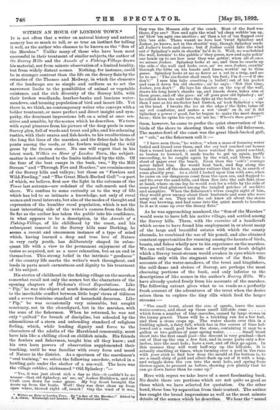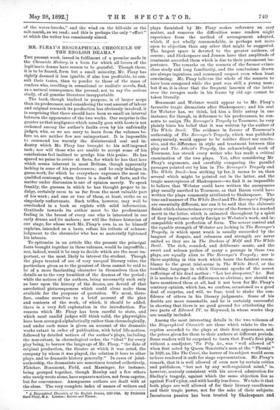WITHIN AN HOUR OF LONDON TOWN.* IT is not often
that a writer on natural history and natural scenery has so much to tell, or so true an instinct for telling it well, as the author who chooses to be known as the "Son of the Marshes." Unlike many of those who have been most
successful in their treatment of similar subjects, the author of On Surrey Hills and the Annals of a Fishing-Village draws his material, not from minute observation of a limited locality, but from widely distant scenes. Nothing, for instance, could be in stronger contrast than the life on the dreary flats by the estuaries of the Thames and Medway, in which the elements of the landscape are so simple and uniform as to set the narrowest limits to the possibilities of animal or vegetable existence, and the rich diversity of the Surrey hills, with their broken woodlands, heather-banks and luscious water. meadows, and teeming population of bird and insect life. Yet
there is, we think, no contemporary writer who conveys with a bolder treatment, or more perfect and direct insight and sym- pathy, the dominant impressions left on a mind at once sen- sitive and sensible, by the scenes which he describes. We turn with equal pleasure from his picture of the deep pools in some Surrey glen, full of weeds and trout and pike, and his scheming rustics, with their snares and fish-hooks, to his recollections of the long flat lines of the marshes, and the fisher-lads in their
punts among the reeds, or the fowlers waiting for the wild geese by the frozen shore. No one will regret that in his latest work, Within an Hour of London Town, the subject- matter is not confined to the limits indicated by the title. Of the four of the best essays in the book, two, "By the Mill Stream" and "Through Firs and Heather," are reminiscences of the Surrey hills and valleys; but those on "Fowlers and Wild-Fowling," and "The Great Black-Backed Gull "—a part of which, we believe, first saw the light in the columns of the Times last autumn—are redolent of the salt-marsh and the shore. We confess to some curiosity as to the way of life which has led to so intimate a knowledge, not only of rural scenes and rural interests, but also of the modes of thought and expression of the humbler rural population, which is not the
least interesting side of the writer's cameos from the fields. So far as the author has taken the public into his confidence,
in what appears to be a description, in the Annals of a Fishing-Village, of his childhood by the coast, and his
subsequent removal to the Surrey hills near Dorking, he seems a recent and uncommon instance of a type of mind which, having learned a deep and true love of Nature in very early youth, has deliberately shaped its subse- quent life with a view to the permanent enjoyment of the tastes so acquired, not as a mere relaxation, but as an end in themselves. This strong belief in the intrinsic " goodness " of the country life marks the writer's work throughout, and lends in parts much earnestness and dignity to his treatment of his subject.
His stories of childhood in the fishing-village on the marshes somewhat recall not only the scenes but the characters of the opening chapters of Dickens's Great Expectations. Like 'Pip," he was the object of much domestic chastisement, due to the inevitable conflict between little boys' views of tidiness and a severe feminine standard of household decorum. Like "Pip," he was occasionally very miserable, but sought sanctuary, not in the churchyard, but in the marshes, with the sons of the fishermen. When he returned, he was not only "quilted" for breach of discipline, but schooled by the admonitions of a stern and unbending standard of religious feeling, which, while lending dignity and force to the characters of the adults of the Marshland community, must have lain like a chilling cloud on childish minds. His friends the fowlers and fishermen, taught him all they knew ; and his own keen powers of observation supplemented their teaching, until he was familiar with every form and mood of Nature in the district. As a specimen of the marshmen's "oral training," we select the following anecdote, related in a
bowling gale under the shelter of a sea-wall. The hero was the village cobbler, nicknamed "Old Splashey : "-
"Yo, it was just about sich a day as this—it couldn't be no wusser—thet old Splashey, an' me, an' Josher Halldown, and old Craft cum down for some geese. My boy, Scoot brought the noose up from the boats. Well ! they was drnv clean up from open water, blowed right off, smack ! Ony the `wust of it was, • Within an Hour of Loudon Town. By,", A Bon of .the Marshall.", Edited by J. A. Owen. Edinburgh and London : W. Blackwood and Bone.
they was the Musson side of the creek. Most of the feed was there, d'ye see? Now and agin the wind 'ad clean wobble 'em up, an' blow 'em agin one another ; an' then a lot of 'em flapped over this 'ere side. There waunt no love lost 'twixt Splashey and Josher, ye knows, not in the shootin' way, though Splashey made all Josher's boots and shoes ; but if Josher could take the wind out o' Splashey's sails in shootin' he'd do it. Well, we was behind the wall, listenin' to the gabble o' they geese, now and agin pokin' our heads up to see how near they was gettin', when all at once we misses Josher. Splashey looks at me, and then he crawls up the side o' the wall and looks over, an' we sees Josher, crawlin' through the blite on his hands and knees, workin' up to thim geese. Splashey looks at me as fierce as a rat in a trap, and sez he to me : The six-footer shall reach 'em fast; I'm d—d if she don't!' I sees him take something [a bullet] out of his pocket and ram it down his old shooter ; an' he says : 'Not this time, Josher, you don't !' He lays his shooter on the top of the wall, draws his long hern's shanks up, and kneels down, takes aim at them geese, and off she goes : an' off goes poor old Splashey ; an' he rolled down the wall into the dyke at the bottom an' then I sees as his six-footer had busted, an' took Splashey a wipe on the head. I breaks the ice at the edge o' the dyke, takes off my red comforter, and makes a wet 'swab' on it, an' it did Splashey a power o' good, fur he begun to make the most desprit faces ; thin he oping his eyes, an' sez he, Where's them geese?'"
Soon, however, he came to prefer the quiet observation of the birds of the shore to shooting them with the old fishermen. The master-fowl of the coast was the great black-backed gall, or "cob," as the fishermen call it :—
"I have seen them," he writes, "when a mass of foaming water boiled and hissed over them, and the cry had reached our homes that a vessel had struck ; and have watched the grand sea-bird, as beaten to leeward, it made tracks to get up again, partly succeeding, to be caught again by the wind, and blown like a sheet of paper over the beach. Even then the 'cob's' courage never failed him. He would beat back, and flap along the breakers just off the shore, marine vulture that he is, in search of some ghastly prey. As a child I looked upon him with awe, when he came on our dangerous coast from the open sea, and flapped to and fro over the sand-hills, and then flew into the salt flats close at hand, where on one leg he would rest for a while by the side of some pool that glistened among the tangled patches of sea-blite and samphire. When the fishermen's wives caught sight of him, they would grow uneasy about their htisbands and sons who were away out at sea. They said the cob knew all about the storm that was brewing, and had come into the quiet marsh to hearken to it as it came up over the dreary flats."
As he was approaching manhood, the "Son of the Marshes" would seem to have left his native village, and settled among the Surrey hills. There, with the exercise of a handicraft which seems to have found him employment in or about many of the large and beautiful estates with which the county abounds, he combined the use of his pencil, and also obtained constant opportunities for roaming among the haunts of birds, beasts, and fishes wholly new to his experience on the marshes. We can well imagine the sense of novelty and fresh delight which a Surrey trout-stream would awaken in eyes which were familiar only with the stagnant waters of the flats. His accounts of the water-meadows, of the trout and kingfishers, the mill-dams and sluices of Surrey, are perhaps the most charming portions of the book, and only inferior to the descriptions of like scenes in the author's Surrey Hills. We
have already quoted freely from his accounts of the marshes. The following extract gives what to us reads as a perfectly fresh account of the adventures of the trout when the desire seizes them to explore the tiny rills which feed the larger streams :—
"The small trout, about the size of sprats, leave the main
water-courses, and shoot up these small hill-side runs which form a number of tiny cascades, caused by large stones in the loamy gravel. There will be a trickling run for a few feet, and then a stone crops up. The water shoots over this in a tinkling splash, a fairy fall, which has in the course of time hol- lowed out a small pool below the stone, containing it may be a gallon or two gallons of pure spring water Small trout shoot into the first small pool—the descent is very gradual—dart out of that up the run a few feet, and in some parts only a few inches, into the next hole; have a rest, and off they go again. In this manner they will work half-way up the hill-side. It is actually startling at times, when turning over a pool in the runs with your stick to find how deep the mould at the bottom is, to see a small strip of gold and silver flash up out of it with a leap, and wriggle down the run into the next hole, and spring from thence again, to proceed as before, showing you plainly that he can go down faster than he came up."
Here with regret we take leave of a most fascinating book.
No doubt there are portions which are not quite as good as those which we have selected for quotation. On the other
hand, these lose by separation from their context. The author has caught the broad impressions as well as the most minute details of the sceneswhich he describes. We hear the" sound
_ — of the water-brooks," and the wind on the hill-side or the salt-marsh, as we read ; and this is perhaps the only " effect " at which the writer has consciously aimed.







































 Previous page
Previous page